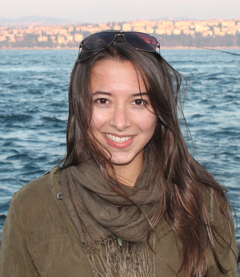Tiger of the Week: Monica Greco ’13, Helping Refugees in Jordan Start a New Life

After Monica Greco ’13 graduated from Princeton, she packed her bags and flew to Amman, Jordan, to begin her yearlong Fulbright scholarship to study Roman military history. But while living in a country in the midst of a refugee crisis, where many families were seeking to start a new life after fleeing from violence in nearby countries, Greco started volunteering with a small nonprofit refugee-aid organization called the Collateral Repair Project (CRP).
“I spent a lot of time on public-policy stuff at Princeton and have always been interested in emergency aid,” said Greco, a classics major who earned a certificate in the Woodrow Wilson School. “CRP is like an extension of me, or I am an extension of it — I’m not sure at this point.”
CRP is located in Amman’s Hashmi Shamali neighborhood, which is home to a large number of Syrian and Iraqi refugees. When a refugee family crosses the Jordanian border, adults are forbidden from working in the country in almost all cases, Greco said. CRP’s emergency-assistance program provides basic amenities like food, medical support, mattresses, cooking utensils, heaters, and fans to families in dire need.
“Things are very, very hard — people can’t work, which means they can’t support themselves,” she said. “So while there’s this relief of not being subject to bombings, violence, kidnappings, and torture, things are still hard when they get to Jordan.”
Greco said that first and foremost, CRP’s mission is to ensure that its beneficiaries’ basic needs are met, but fostering an inclusive community environment for both families with and without refugee status is also a big part of what the organization does. Each year, more than 500 families pass through CRP’s community center to take part in activities like English and computer classes, women’s leadership sessions, post-traumatic stress disorder programming, and children’s and teen groups.
“Refugee life is sort of characterized by being stuck in your house,” Greco said. “Parents are forbidden from working, no one really goes out — it’s like a forced sedentary life. I think we really succeed in creating an environment where people can try to pick up where they left off — socialize, have relationships, and feel safe.”
But for refugee-aid organizations CRP, the biggest problem is being able to help the ever-increasing amount of families crossing the border with a limited amount of available funding. Many of the bigger agencies are beginning to run out of money as well, Greco said.
One advantage of a small-scale organization like CRP, which has a staff of fewer than 10 people (many of whom are refugees themselves) and relies heavily on volunteers, is the ability to respond to people’s needs quickly. Oftentimes, a family may cross the border during the middle of the night and will need immediate help, which the larger agencies aren’t able to address as quickly.
Greco, who is currently serving on CRP’s board of directors as treasurer while she pursues a master’s degree in refugee and forced migration studies at the University of Oxford, said that monetary donations are especially important to organizations like CRP since the funding for aid efforts has essentially dried up. Simply raising awareness by sharing information about the situation in the Middle East can also make a difference, she added.
“Now that [the crisis] has spilled over into Europe, the refugee crisis in the Middle East is getting more attention as well,” she said. “But because so much aid has been cut, there are some families that are even going back to Syria … things are getting pretty bad in terms of money to help people.”
Greco, who plans to continue her duties with CRP after graduation next spring, said she envisions herself still working with refugees five years from now. She is optimistic about what the future holds: “Hopefully the work that needs to be done will be very different at that point.”











No responses yet